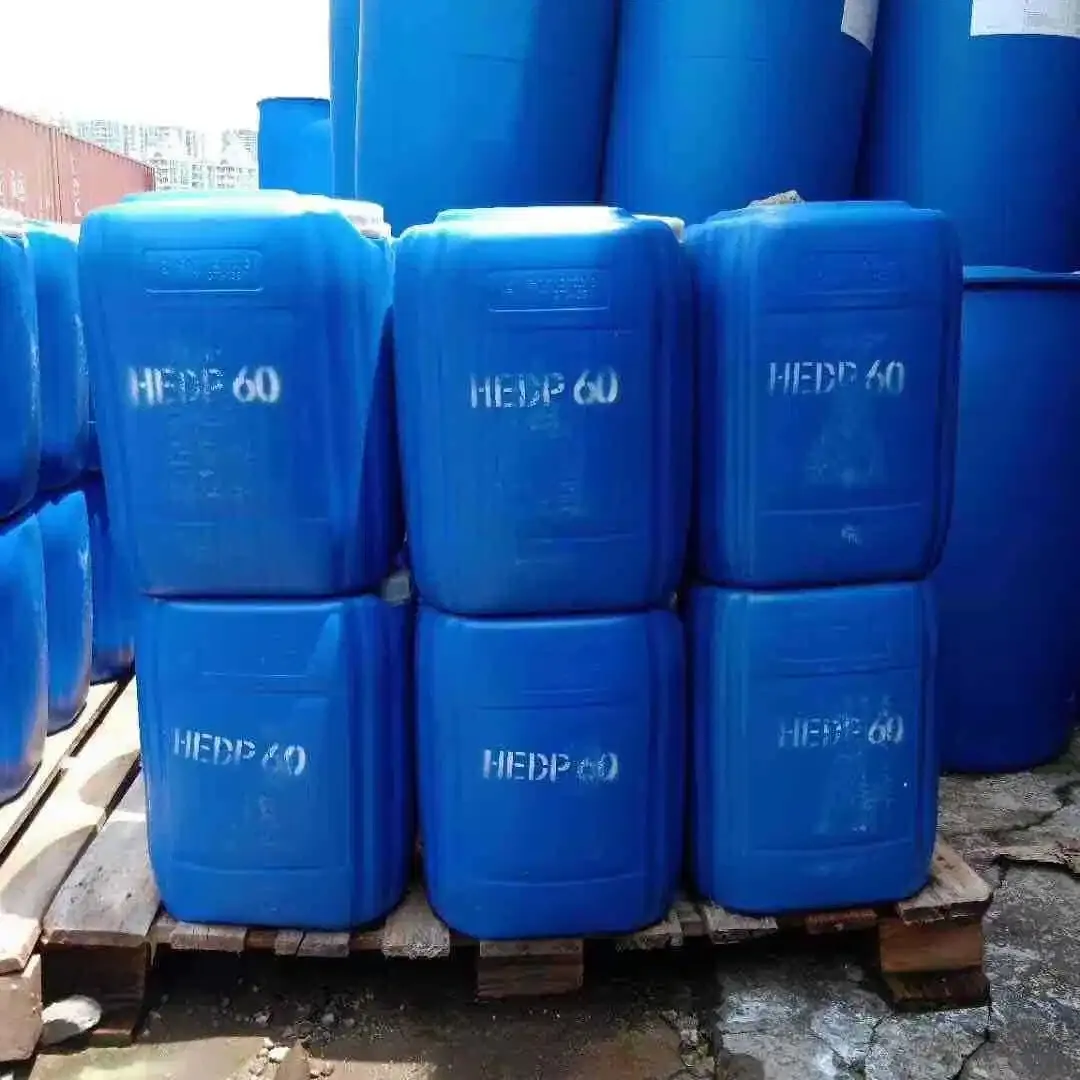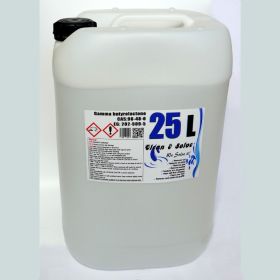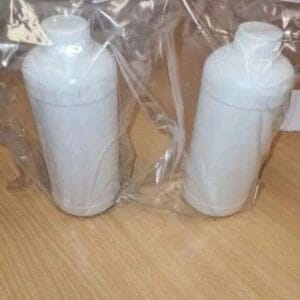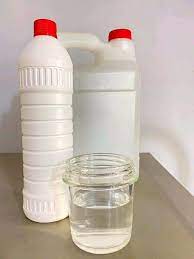What is HEDP Solution?
HEDP, or 1-hydroxyethylidene-1,1-diphosphonic acid, is a highly effective organic phosphonic acid recognized for its exceptional properties as a corrosion inhibitor in various industrial applications. This compound is widely utilized due to its chemical structure, which includes two phosphonate groups contributing to its strong chelating ability and affinity for metal ions. These attributes allow HEDP to form stable complexes with metal surfaces, significantly reducing the risk of corrosion and enhancing the longevity of equipment and systems.
The effectiveness of HEDP as a corrosion inhibitor stems from its ability to break the electrochemical process that leads to metal degradation. Adhering to metal surfaces creates a barrier that inhibits the interaction between corrosive agents, such as oxygen and moisture, and the underlying metal. This action helps to preserve the integrity of various materials, especially in settings that involve water exposure, such as cooling systems, boilers, and oilfield applications.
Industrially, HEDP is widely employed in water treatment applications, mitigating scale formation and corrosion in pipelines and heat exchangers. Additionally, HEDP finds its utility in cleaning and maintaining industrial machinery, where preventing metal loss is essential for optimal performance. Its applications extend to the oil and gas sector, where HEDP is used to protect equipment from the corrosive effects of brine and other harsh substances found in extraction processes. Furthermore, HEDP is ideal for use in detergents and industrial cleaning solutions, amplifying its significance as a versatile agent in maintaining metal integrity in various sectors.
How HEDP Works as a Corrosion Inhibitor
HEDP, or Hydroxyethylidene Diphosphonic Acid, is recognized for its effectiveness as a corrosion inhibitor in various industrial processes. The primary mechanism by which HEDP inhibits corrosion involves its ability to interact with metal surfaces, forming a protective layer that prevents the onset of oxidation. This interaction happens when HEDP molecules adsorb onto the metal interface, creating a stable complex that is not easily displaced by aggressive ions in the environment.
The chemical structure of HEDP allows it to chelate metal ions, which further contributes to its protective capabilities. When HEDP comes in contact with metal, it binds to the surface through its phosphonic acid groups, creating a barrier that minimizes direct exposure of the metal to corrosive agents such as oxygen and water. This thin layer of protection significantly reduces the corrosion rates experienced in various industrial applications, including cooling systems, oil and gas pipelines, and water treatment facilities.
Furthermore, empirical data from numerous case studies illustrates the effectiveness of HEDP as a corrosion inhibitor. For example, in sectors such as oil and gas, HEDP has been shown to reduce corrosion rates by as much as 70% when used in combined forms with other treatment agents. In water treatment applications, regular usage of HEDP can enhance equipment longevity by mitigating the effects of corrosion-related failures. These examples demonstrate that the application of HEDP not only protects equipment but also contributes to cost savings through reduced maintenance and downtime.
In conclusion, HEDP is vital in protecting metal surfaces from corrosion. HEDP effectively reduces oxidation risk and promotes longer equipment life across various industrial sectors by forming a protective layer and chelating metal ions.
Applications of HEDP Solution in Industry
The HEDP solution, or hydroxyethylidene diphosphonic acid, is recognized as an effective corrosion inhibitor that finds widespread application across various industrial sectors. Its primary utility lies in treating water systems, such as cooling towers, boilers, and heat exchangers, which is crucial in protecting these systems from corrosive damage. HEDP helps maintain thermal efficiency in cooling towers by preventing scale formation and biofouling, significantly extending equipment lifespan and improving operational reliability.
Boilers generating steam for various industrial processes are also beneficiaries of HEDP treatment. Here, the inhibitor aids in preventing scale buildup and pitting corrosion, which can lead to costly downtime and repairs. By utilizing HEDP, industries can achieve substantial cost savings through reduced maintenance needs and extended equipment durability. Additionally, HEDP is highly effective in heat exchangers, where it ensures optimal heat transfer by mitigating deposition and corrosion, further enhancing overall system efficiency.
Numerous industries heavily rely on HEDP for their corrosion prevention strategies. The power generation sector, including thermal and nuclear plants, often utilizes HEDP due to the challenging water conditions encountered in such applications. Similarly, the oil and gas industry employs HEDP to protect production facilities and pipelines from corrosive environments. Other sectors benefiting from HEDP include manufacturing, food processing, and pulp and paper industries, where the need for efficient water treatment systems prevails.
Overall, the diverse range of applications for HEDP solutions underscores its significance as a corrosion inhibitor in industrial settings. By integrating HEDP into their water treatment processes, industries can ensure improved efficiency, significant cost reductions, and enhanced asset longevity, highlighting the importance of this versatile chemical compound in modern industrial operations.
Buying HEDP Solution: What to Consider
When purchasing HEDP solution, several critical factors must be evaluated to ensure that the selected product meets the required standards for industrial applications. First and foremost, determining the quality of the HEDP solution is essential. High-quality products are characterized by their effectiveness as corrosion inhibitors, directly impacting their performance in various processes. It is advisable to ascertain the concentration of HEDP and check for any additives that may diminish its efficacy.
Sourcing reputable suppliers is another pivotal consideration. Potential buyers should conduct thorough research on manufacturers and distributors, prioritizing those with experience and positive reviews in the industry. Verifying their credentials, such as industry experience and client testimonials, can help select a reliable partner. Engaging with suppliers known for adhering to strict quality control measures and providing product documentation is crucial for ensuring that the HEDP solution meets specifications.
Understanding the pricing structure of HEDP solutions is also vital. Prices can vary based on concentration, purity, and quantity ordered. It is beneficial to compare quotes from multiple suppliers, considering that the lowest price may not always indicate the best value. Bulk purchasing options can often lead to significant savings, so it is worth exploring these arrangements if your organization consistently demands an HEDP solution.
Lastly, checking for certifications and compliance with industry standards is essential when purchasing HEDP solutions. Look for certified products that adhere to safety and environmental regulations, as these factors are critical for maintaining operational integrity and meeting legal requirements. Ensuring that the solution complies with relevant standards affirms its quality and mitigates potential risks associated with its use in industrial applications.
Conclusion
In summary, the HEDP solution has proven to be an effective corrosion inhibitor for various industrial applications. Its chemical properties enable it to form a protective layer on metal surfaces, significantly reducing the risk of corrosion and extending the lifespan of machinery and equipment. This characteristic is essential in industries where equipment exposure to harsh conditions can lead to rapid degradation, increasing maintenance costs, and operational downtimes.
Moreover, HEDP is versatile and can be used across multiple sectors, including water treatment, oil and gas, and manufacturing. This adaptability is a significant advantage, allowing companies to implement a single corrosion prevention strategy that meets their diverse needs. In addition, the compatibility of HEDP with other chemicals enhances its utility, ensuring that it can be effectively integrated into existing processes without compromising performance.
Ultimately, the long-term benefits of using HEDP solutions extend beyond mere protection. By preventing corrosion, businesses can save on replacement and repair costs, improve operational efficiency, and enhance overall productivity. Additionally, adopting effective corrosion inhibitors such as HEDP can significantly contribute to sustainability efforts by minimizing waste and the environmental impact associated with the deterioration of materials.
In light of these advantages, it is recommended that industrial operations seriously consider the implementation of HEDP solutions in their corrosion management strategies. By doing so, companies can ensure excellent durability and reliability of their assets, enhancing their competitive edge in the market. In conclusion, adopting HEDP as a corrosion inhibitor protects metal surfaces and is a strategic investment toward operational excellence and environmental stewardship.










